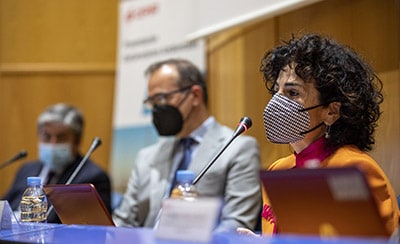- Palermo industrial centers maintain investment and environmental management levels, totaling 42.7 million in 2020
- The Cepsa refinery in Palos was the first in Spain to be registered in the European registry of Ecoaudited centers, according to EMAS
Cepsa has presented, for yet another year, the environmental declarations of its industrial centers in the province of Huelva, the La Rábida Refinery, and the Palos Chemical Plant. These documents contain all the information related to the environmental performance of the facilities in 2020, audited by AENOR, an independent external verifier.
It was in 1998 when the refinery's Environmental Statement was made public for the first time, with the international registration of Eco-audited centers according to the European Regulation EMAS (Eco-Management and Audit Scheme). It was the first refinery in Spain to obtain it; only two years later the first environmental statement of the Palos Chemical Plant was published, with international registration since 2010. For 23 years now, Cepsa has been making the statement public, not only to the media but also to stakeholders, and has set up an e-mail account comunicacion.huelva@cepsa.com for all citizens to ask questions they need answers to.
During the past year, both centers adopted the necessary measures not only to comply with the requirements of their respective Integrated Environmental Authorizations (AAI), but also to achieve emission values well below the authorized limits, including the new requirements established by the European Union of the applicable BREFs (Best Available Techniques), which came into force in 2020.
In terms of environmental investment and expenses, Cepsa allocated almost 43 million euros, mainly to projects to improve energy efficiency, reduce atmospheric emissions, and treat liquid effluents. Since 1997, Cepsa has spent a total of 905 millions of euros.
Regarding compliance with the objectives, the result achieved was very positive at 96.3% and 99.1% of the targets set at the Refinery and the Chemical Plant, respectively. The actions planned for continuous improvement in the management and reduction of emissions, discharge, and waste were carried out in an outstanding and efficient manner.
In addition, the environmental statements contain information on many other aspects available to the public, ranging from noise control to soil inspection and water use. Additionally, Cepsa's environmental management is not limited to the control of parameters its activity may have an impact on, but extends to other issues such as training and environmental awareness of its own professionals and those of auxiliary companies, and communication to interested third parties.
During the presentation, Jorge Acitores, director of La Rábida Refinery, emphasized that "in our commitment to reduce the footprint of our activity on the environment, we consider process optimization and energy efficiency improvement to be a priority. The commitment to being an environmentally responsible company goes beyond compliance with regulations or obtaining certificates. It is a real competitive advantage and an engine for innovation at the refinery." For her part, Esther Gonzalez, director of the Cepsa chemical plant in Palos, added that "making these audited statements public and disseminating our environmental management results are a show of transparency and commitment to citizens, who can see, year after year, the progress and continuous improvement to be among the leading companies in the energy sector."
La Rábida Refinery. Main Results
The average annual concentrations emissions to the atmosphere were below the limits set in the Integrated Environmental Authorization. The contribution of gas emissions to the average pollutant emission values measured at the stations of the Air Quality Monitoring and Surveillance Network of Andalusia, both in Huelva city and in the province, is marginal with respect to the applicable limits.
In terms of total SO2 emissions according to the quantity of crude processed, a value of 0.30 kg SO2/t of treated crude was obtained, one of the lowest values ever recorded. Since 2000, a reduction of 86% has been achieved.
The discharge quality has seen a significant improvement since 1995. In 2020, average concentrations were below the limits set out in the Integrated Environmental Authorization, with values ranging from 5% to 67% of the permitted limit for the main parameters. The level of compliance with the legally established control parameters has been very close to 100%.
In 2020, the total quantity of waste was 8,044 tons. Cepsa prioritizes management that ensures the most efficient use. To this end, 3,412 tons were recovered, representing 42% of the total.
With the aim of improving the energy efficiency index, in 2014 the Refinery obtained certification for its Energy Management System. This certification aims to promote efficiency, reduce the gas emissions that cause climate change, guarantee compliance with legislation and ensure the best possible use of surplus energy. In 2020, the energy efficiency index was 85.6. Since 2010, efficiency has risen 13 units.
In recent years, the sulfur specifications for automotive diesel and petrol have lowered their content to 0.001% (10 ppm). In order to comply with this requirement, Cepsa has invested in making improvements and enhancements to its desulfurization processes. These investments facilitate a reduction in SO2 emissions of these products in cities through the exhaust pipes of vehicles in general, thereby improving air quality.
On the other hand, European directives and Spanish legislation have set goals for 2020 to ensure that 8.5% of the energy present in all our petrol and diesel fuels comes from the use of biofuels.
Palos Chemical Plant. Main Results
By using only gaseous fuels, principally natural gas, for the production processes of the Palermo petrochemical center, particle and SO2 emissions are minimal, falling below the detection limits of the measurement methods. With regard to NOx (nitrogen oxide) emissions, the annual emissions average of the main source is maintained below the limits established by the applicable legislation.
In 2020, the discharge quality indexes were maintained with respect to previous years, expressed as a global indicator of the main parameters limited by the Integrated Environmental Authorization. As compared the "base" value of 1998, it has improved by 93.9 percent.
In this period, 4,403 tons of waste were managed, of which 2,960 tons (67.2%) were sent for recovery.
In 2015, the Cepsa chemical plant's Energy Management System earned UNE EN-ISO 50001 certification. This certification aims to promote efficiency in production processes, promote the use of surplus energies, reduce gas emissions that contribute to climate change and to ensure compliance with legislation. In 2020, the energy efficiency index was 7.6% higher than 2019. This was the result of a lack of stability in operations due to market conditions and the reduction in sales of cumene, the manufacture of which requires less energy consumption. Since 2010 it has improved by 4.7% thanks to investment and optimization of operations.
It is important to note that since 2019 production activity at the Palos plant has run on 100% renewable electrical power. This power was supplied by Cepsa's Gas and Electricity division and translated into a significant reduction in the facility's carbon footprint, preventing 76,744 t of CO2 emissions.
As regards the balance of CO2 emissions, the third rights trading period (2013-2020) ended in 2020. The 2020 report for the two Huelva centers showed a deficit of 404,265 CO2 rights, due to the fact that their electricity cogeneration facilities, as in the whole of Europe, have stopped receiving free rights.
Fundación Cepsa in the environment
In 2020, the environmental awareness educational programs for young people continued in the first quarter of the year, as well as the maintenance and public use actions in the Laguna Primera de Palos and in the Dunas del Odiel Botanical Garden. Additionally, the recently inaugurated interpretative endowment in the "Sabinar del Estero," in the Marismas del Odiel Natural Park, was started up. All these actions are included in the collaboration agreement with the Territorial Office of Agriculture, Livestock, Fisheries and Sustainable Development of the Junta de Andalucía.
In addition, through collaboration agreements with the University of Huelva and the city government of Palos de la Frontera, activities were carried out to promote research into sustainability, environmental education, care and enhancement of the environment, and the development of environmentally friendly policies.
The Company, as well as its Foundation, is committed to the UN's Sustainable Development Goals (SDGs), and aligns its initiatives and projects with these goals, identifying the following as a priority: "Affordable and clean energy"; "Decent work and economic growth"; "Responsible production and consumption"; and "Climate action."


